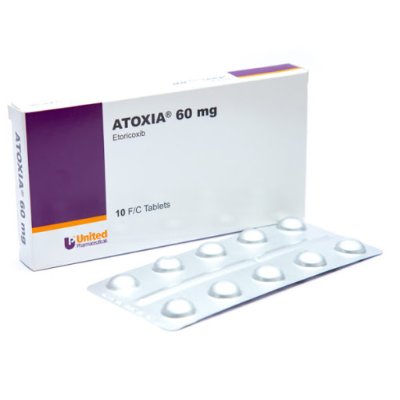


Ankylosing spondylitis
Gouty arthritis
Relief of acute pain associated with dental surgery
Symptomatic relief in the treatment of osteoarthritis
Symptomatic relief in the treatment of rheumatoid arthritis
In patients with mild hepatic impairment (Child-Pugh score 5 to 6) a dose of 60 mg once daily should not be exceeded.
In patients with moderate hepatic impairment (Child-Pugh score 7 to 9) a dose of 30 mg once daily should not be exceeded.
Children under 16 years
Females attempting to conceive
Breastfeeding
Cerebrovascular disorder
Galactosaemia
Gastrointestinal haemorrhage
Inflammatory bowel disease
Ischaemic heart disease
Peptic ulcer
Peripheral arterial circulatory disorder
Pregnancy
Renal impairment - creatinine clearance below 30 ml/minute
Severe congestive cardiac failure
Severe hepatic impairment - Child-Pugh score greater than or equal to 10
Uncontrolled hypertension
Allergic disposition
Elderly
Females of childbearing potential
Oedema
Risk factors for cardiovascular disorder
Asthma
Cardiac impairment
Connective tissue disorder
Dehydration
Glucose-galactose malabsorption syndrome
Hepatic cirrhosis
Hepatic impairment
History of cardiac failure
History of gastrointestinal bleeding
History of gastrointestinal perforation
History of gastrointestinal ulceration
Lactose intolerance
Left ventricular dysfunction
Renal impairment
Do not use as a substitute for acetylsalicylic acid for CV prophylaxis
May mask fever
May mask signs of inflammation
Advise ability to drive/operate machinery may be affected by side effects
Consider the need for combination therapy with gastroprotective agents
Correct severe dehydration before commencing therapy
Ensure hypertension is controlled prior to treatment
Contains lactose
Monitor blood pressure regularly
Monitor hypertensive patients for 2 weeks after start of treatment
Monitor patients for signs of adverse cardiovascular effects
Monitor renal function in patients with hepatic cirrhosis
Monitor renal function in patients with uncompensated cardiac failure
Patients on prolonged therapy should be regularly reviewed
Consider discontinuing therapy if significant cardiac failure develops
Advise patient to seek advice at first indications of pregnancy
Discontinue if ALT level exceed 3 times the upper limit of normal & persist
Discontinue if AST level exceed 3 times the upper limit of normal & persist
Discontinue if drug-related rash or other hypersensitivity reactions occur
Discontinue if renal function deteriorates
Discontinue if significant/persistent hepatic function abnormalities occur
Maintain treatment at the lowest effective dose
Female: Ensure adequate contraception during treatment
Etoricoxib is contraindicated in pregnancy.
The use of etoricoxib is not recommended in women attempting to conceive.
Insufficient clinical data on exposed pregnancies is available for etoricoxib. Studies in animals have shown reproductive toxicity. The potential for human risk in pregnancy is unknown. Etoricoxib, as with other drugs inhibiting prostaglandin synthesis, may cause uterine inertia, miscarriage, congenital defects, premature closure of the ductus arteriosus leading to pulmonary hypertension and oligohydramnios during the last trimester. If a woman becomes pregnant during treatment, etoricoxib should be discontinued.
Etoricoxib is contraindicated in breastfeeding.
It is not known whether etoricoxib is excreted in human milk, but other cox-2 inhibitors such as celecoxib are excreted into breast milk. Etoricoxib is excreted in the milk of lactating rats. Because of the lack of data regarding its use during lactation, and the potential for serious adverse effects in the newborn, etoricoxib should not be used during breastfeeding.
Abdominal distension
Abdominal pain
Acid regurgitation
Altered bowel habit
Alveolar osteitis
Anaemia
Anaphylactic reaction
Anaphylactoid reaction
Angina pectoris
Angioedema
Anxiety
Arrhythmias
Asthenia
Atrial fibrillation
Blurred vision
Bronchospasm
Cerebrovascular accident
Chest pain
Confusion
Congestive cardiac failure
Conjunctivitis
Constipation
Cough
Creatine phosphokinase increased
Decrease in mental acuity
Decreased serum sodium
Depression
Diarrhoea
Disturbances of appetite
Dizziness
Dry mouth
Dysgeusia
Dyspepsia
Dyspnoea
Ecchymosis
ECG changes
Epigastric discomfort
Epistaxis
Erythema
Facial oedema
Fatigue
Fixed drug eruption
Flatulence
Flushing
Gastritis
Gastro-enteritis
Gastro-intestinal perforation
Gastrointestinal bleeding
Hallucinations
Headache
Heartburn
Hepatic failure
Hepatitis
Hypaesthesia
Hyperkalaemia
Hypersensitivity reactions
Hypertension
Hypertensive crisis
Hyperuricaemia
Increase in blood urea nitrogen
Increase in serum ALT/AST
Influenza-like symptoms
Insomnia
Irritable bowel syndrome(IBS)
Jaundice
Leukopenia
Mouth ulcers
Muscle cramps
Muscle spasm
Musculoskeletal pain
Myocardial infarction
Nausea
Oedema
Oesophagitis
Palpitations
Pancreatitis
Paraesthesia
Peptic ulceration
Proteinuria
Pruritus
Rash
Renal failure
Renal impairment
Restlessness
Serum creatinine increased
Somnolence
Stevens-Johnson syndrome
Tachycardia
Thrombocytopenia
Tinnitus
Toxic epidermal necrolysis